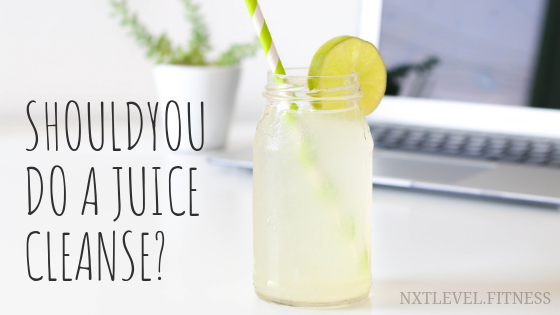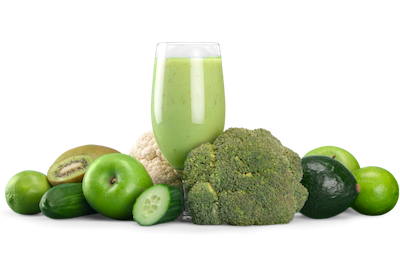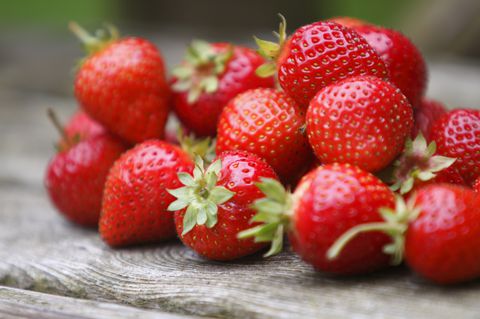Should You Do A Juice Clenase?

Should You Do A Juice Cleanse?
While quick fixes to help restore the body such as fasting and detoxing have been around for millenniums, the juice cleanse is a relatively new phenomenon. But does a juice cleanse have real medical benefits or is it just the latest in trendy weight loss fads? Here’s everything you need to know about juice cleanses to decide whether they’re right for you.
What is a juice cleanse?
A juice cleanse is a period of typically 3-7 days where a person only consumes juices made from fruit and/or vegetables. The goal of this to eliminate toxins from the body in order to help reset its mental physical state. A cleanse is different from a fast. Fasts involve no nutrient or caloric intake, while cleanses focus on the quality of nutrients you put into your body.
PROS AND CONS OF A JUICE CLEANSE
Benefits of a juice cleanse
You can find numerous examples, both anecdotal and documented in peer-reviewed studies, which highlight the benefits of a juice cleanse. A 2017 study , published in the journal Scientific Reports, found that drinking six bottles of fruit-vegetable juice per day for a three-day period “induced significant changes in the intestinal microbiota which were associated with weight loss.” Participants in the study lost an average of 3.75 pounds during their cleanse and kept an average of two pounds off after two weeks. Most also reported higher levels of well-being two weeks after the cleanse.

A separate research project, published in the February 2017 issue of the journal Nutrients, found that fruit and vegetable concentrate could benefit overweight adults by reducing systemic inflammation and other risk factors for chronic disease. Other studies have found that vegetable and fruit juices consumed as part of a normal diet can help boost antioxidants, improve overall gut health and potentially reduce the risk of cardiovascular disease. Because fruits and vegetables are high in minerals and vitamins, a short-term juice cleanse can boost overall health by bringing extra nutrients into the body.
Cons of a juice cleanse
Simply put, a juice cleanse is not sustainable as a long-term diet plan and can actually be damaging if used for several weeks in a row. A juice-based diet denies you many essential nutrients that your body needs such as proteins and essential fats. Without essential fats, the body cannot process fat-soluble vitamins such as Vitamin D, K and A. Furthermore, unless a juice cleanse is used to kickstart an overall lifestyle change in diet and exercise, many people who undergo one will find that they quickly gain back the weight they lost.
A juice cleanse may not be beneficial depending on the types of juices that are consumed. Juices with high concentrations of fruit can contain high concentrations of sugar, which can cause wildly fluctuating blood sugar levels that result in peaks and crashes in energy throughout the day. The moments of low energy could also lead to your body craving foods that are rich in carbohydrates to restore homeostasis.
There are also negative effects in the long-term on only getting nutrients that you need from fruit juice instead of whole fruit. A 2013 study from the Harvard School of Public Health found that people who ate whole fruits had a reduced risk for type-2 diabetes, but participants who consumed those same fruits in juice form had higher risk for the disease.
In the short-term, some people who do juice cleanses report mood swings, aches and decreases in energy. This is to be expected since your body is attempting to release built up toxins and isn’t used to receiving nutrients in the form of multiple beverages per day.
PRE AND POST JUICE CLEANSE (AND EVERYTHING IN BETWEEN)
Prepare for your juice cleanse
Before you get to the cleanse, you should spend at least three days doing a pre-cleanse to help minimize any potential side effects and get your body prepared. Many of the steps in a pre-cleanse should become an integral part of your new lifestyle once your juice cleanse is complete.
You should increase your water intake in a pre-cleanse since water transports nutrients to your cells. Adding more fruits and vegetables to your diet will up your enzyme intake and cutting back on animal products a week before the cleanse will help reduce any unnecessary burdens on your digestive system.
Cutting back on caffeinated drinks such as coffee or soda is also important in order to bring your body into a more alkaline state. If cutting back isn’t coffee isn’t possible with your lifestyle (trust us, we can relate!), switch the lattes with a low-acid, cold-brew coffee.
During your juice cleanse
If you’re going to consume six bottles of juice per day, space them apart every two hours and set an alarm on your phone to stay consistent. Skipping juices could result in a decrease in blood sugar levels and increase feelings of hunger. You also want to avoid “making up” for a missed juice by consuming two or more in one sitting since this will also affect your blood sugar levels.
It’s also important to note that during the first three days of a juice cleanse, small amounts of food are not off-limits. A green salad, handful of nuts or an avocado will not undo all the work you’re doing. Don’t beat yourself up for feeling hungry and honor what your body is telling you.
Exercise during juice cleanses
 Your caloric intake during this process will be high enough to continue exercising. However, you should listen to your body and adjust as needed. If you feel fatigued or have low energy in the first day or two, opt for yoga or light jogging. Avoid lengthy or high-impact workouts such as sprinting during your cleanse.
Your caloric intake during this process will be high enough to continue exercising. However, you should listen to your body and adjust as needed. If you feel fatigued or have low energy in the first day or two, opt for yoga or light jogging. Avoid lengthy or high-impact workouts such as sprinting during your cleanse.
Introducing foods back into your diet
After a few days of a juice cleanse, your body will naturally start craving whole foods.On Day 4, you should cut your juice intake to breakfast and begin to eat a healthy lunch and dinner each day.
Ease yourself back into whole foods. Your first few days post-cleanse should include lots of whole fruits and vegetables. Avoid red meats, heavy foods, dairy and alcohol during this time.
MAXIMIZE YOUR CLEANSE
In order to get the most out of your cleanse while also making it as comfortable (and delicious as possible), add these five tips to your plan: Always read the labels Not all juices are the same, especially if you’re buying being them pre-made. A drink called “Green Machine” might sound healthy, but could contain more than 50 grams of sugar per bottle. Check the labels to make sure your juice doesn’t have any added preservatives or sugars.
Buy organic when possible
The Environmental Working Group (EWG) reports that nearly 70 percent of all produce sold in the U.S. contains pesticide residue. In total, conventional produce contains about 178 different pesticides. Do you want that added into your juice?
If buying organic isn’t possible, look for fruits and vegetables that have been found to contain fewer pesticides (avocado, pineapples, sweet peas) and avoid those that typically have more (strawberries, spinach, kale). The EWG also has a handy Dirty Dozen and Clean 15 guide as a reference.

Opt for lower-sugar fruits
Choose fruits that are lower on the glycemic index such as:
|
|
Spice it up
It can take awhile to get used to the taste of green juices, so adding in lemon, ginger or spices such as cilantro can make it more palatable. This is also a great way to disguise the taste of vegetables that you may not prefer as much.
Drink It immediately
Juice loses its nutrient content the longer its exposed to oxygen. If it’s not possible to drink it as soon as you make it, keep it in an airtight container in your fridge.
TALK WITH YOUR DOCTOR
 Before beginning a juice cleanse, consult with a physician or medical professional to determine if it’s safe for you. Juice cleanses can alter the way certain prescription drugs are metabolized in the body, such as anti-coagulants and anti-platelet medications. People with diabetes or chronic liver, kidney and gallbladder problems should avoid juice cleanses, as well as those who are
Before beginning a juice cleanse, consult with a physician or medical professional to determine if it’s safe for you. Juice cleanses can alter the way certain prescription drugs are metabolized in the body, such as anti-coagulants and anti-platelet medications. People with diabetes or chronic liver, kidney and gallbladder problems should avoid juice cleanses, as well as those who are
pregnant or nursing.
——
Have you done a juice cleanse before? Tell us about your experience in the comments!

Leave a comment
Comments will be approved before showing up.
Also in Blog

Personalized Fitness Training: Why It’s the Future of Health and Wellness
Personalized fitness training tailors every workout to your goals and lifestyle, ensuring sustainable progress and real results.

Top Reasons to Try Interval Training in Bootcamp Classes
Interval training in bootcamp classes at NXT Level Fitness helps you burn calories, build strength, and stay motivated.


